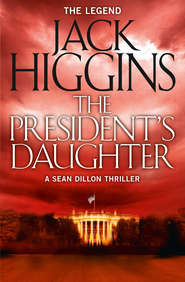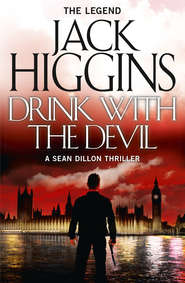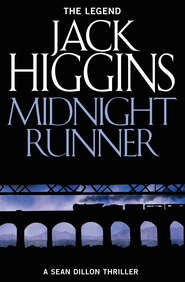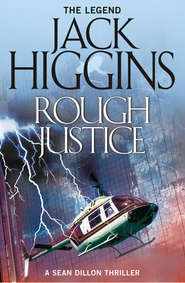По всем вопросам обращайтесь на: info@litportal.ru
(©) 2003-2024.
✖
The Dark Side of the Street
Автор
Год написания книги
2018
Настройки чтения
Размер шрифта
Высота строк
Поля
It was a woman who had spoken – a woman with a pronounced Yorkshire accent and he peered forward trying to see her as he replied, ‘Babylon.’
‘Too far for me, but I can take you part of the way.’
She moved close, her face a pale blur in the darkness, then turned without another word and walked away. Hoffa followed her, the loose stones of the track rattling under his feet. In spite of his long sleep, he was tired. It had, after all, been quite a day and somewhere up ahead there had to be food and a bed.
They walked for perhaps half a mile, climbing all the time and he was aware of hills on either side of them and the cold chill in the wind and then the track turned a shoulder and below in a hollow beside a stream was a farmhouse, a light in the downstairs window.
A dog barked hollowly as she pushed open a five-barred gate and led the way across the cobbled yard. As they approached the front door, it opened suddenly and a man stood there framed against the light, a shotgun in his hands.
‘You found him then, Molly?’
For the first time Hoffa had a clear view of the girl and realised with a sense of surprise, that she couldn’t have been more than nineteen or twenty years of age with haunted eyes and a look that said she hadn’t smiled in a long time.
‘Will you want me for anything more tonight?’ she said in a strange dead voice.
‘Nay, lass, off you go to bed and look in on your mother. She’s been asking for you.’
The girl slipped past him and he leaned a shotgun against the wall and came forward, hand outstretched. ‘A real pleasure, Mr Hoffa. I’m Sam Crowther.’
‘So you know who I am?’ Hoffa said.
‘They’ve been talking about nowt else on the radio all night.’
‘Any chance of finding out where I am?’
Crowther chuckled. ‘Three hundred and fifty miles from where you started off. They won’t be looking for you round here, you may be certain of that.’
‘Which is something, I supppose,’ Hoffa said. ‘What happens now? Do we move into Phase Two yet?’
‘I had a telephone call from London no more than an hour ago. Everything went as smooth as silk. You’ll have no worries from now on, Mr Hoffa.’ He turned and called over his shoulder, ‘Billy – where are you, Billy? Let’s be having you.’
The man who appeared in the doorway was a giant. At least six feet four in height, he had the shoulders and arms of an ape and a great lantern jaw. He grinned foolishly, a dribble of saliva oozing from the corner of his mouth as he shambled into the yard and Crowther clapped him on the shoulder.
‘Good lad, Billy, let’s get moving. There’s work to be done.’ He turned and smiled. ‘This way, Mr Hoffa.’
He led the way across the yard, Hoffa at his heels, Billy bringing up the rear and opened a gate leading into a small courtyard. The only thing it seemed to contain was an old well surrounded by a circular brick wall about three feet high.
Hoffa took a step forward. ‘Now what?’
His reply was a single stunning blow from the rear delivered with such enormous power that his spine snapped like a rotten stick.
He lay there writhing on the ground and Crowther stirred him with the toe of his boot. ‘In he goes, Billy.’
Hoffa was still alive as he went headfirst into the well. His body bounced from the brickwork twice on the way down, but he could feel no pain. Strangely enough, his last conscious thought was that Hagen had been right. It had been his funeral after all and then the cold waters closed over him and he plunged into darkness.
2
Cops and Robbers
When the noon whistle blew a steady stream of workers began to emerge from Lonsdale Metals. In the café opposite the main gates Paul Chavasse got to his feet, folded his newspaper and went outside. It was precisely this busy period that he had been waiting for and he crossed the road quickly.
The main entrance itself was blocked by a swing bar which was not raised until any outgoing vehicle had been checked by the uniformed guard, but the workers used a side gate and crowded through it slowly to a chorus of ribald comments and good humoured laughter.
Undistinguishable from the rest of them in brown overalls and tweed cap, Chavasse plunged into the crowd, working against the stream. He met with some good natured abuse as he forced his way through, but a moment later he was inside the gate. He moved through the crowd, glancing quickly through the window of the gatehouse on his left, noting the three uniformed security guards at the table, coffee and sandwiches spread before them, an Alsatian squatting in the corner.
The workers were still moving towards the gate in a steady stream and Chavasse passed through them quickly, crossed the yard to the main block and entered the basement garage. He had spent the previous night poring over the plans S2 had provided until the layout of the building was so impressed on his mind that he was able to move with perfect confidence.
There were still one or two mechanics about, but he ignored them, mounted the ramp, walked behind the line of waiting vehicles parked in the loading bay and pressed the button for the service lift. A moment later he was on his way to the third floor.
It was strangely quiet when he stepped out and he paused, listening, before moving along the corridor. The door to the wages office was on the third from the end and marked Private. He glanced at it briefly in passing, turned the corner and opened a door which carried the sign Fire Exit. Concrete stairs dropped into a dark well beneath him and on the wall to his left he found what he was looking for – a battery of fuse boxes.
Each box was numbered neatly in white paint. He pushed the handle on number ten into the off position and returned to the corridor.
He knocked on the door of the wages office and waited. This was the crucial moment. According to his information, the staff went to lunch between noon and one o’clock leaving only the chief cashier on duty, but nothing was certain in this life – he had learned that if nothing else in seven years of working for the Bureau and there were bound to be days when someone or other decided to have sandwiches instead of going out. Two he could handle – any more than that and he was in trouble. Not that it mattered – it all came down to the same thing in the end and he smiled wryly. On the other hand it might be amusing to see just how far he could go.
A spyhole flicked open in front of him and he caught the glint of an eye.
‘Mr Crabtree?’ Chavasse said. ‘I’m from Maintenance. There’s been a partial power failure on this floor and I’m checking each office to find the cause. Is everything all right here, sir?’
‘Just a moment.’ The cover of the spyhole dropped into place. A moment later there was the rattle of a chain, the door opened and a small white haired man peered out. ‘The lights don’t seem to be working at all. You’d better come in.’
Chavasse stepped inside, noting in that first quick moment that they were alone and Crabtree busied himself in locking and chaining the door again. He was perhaps sixty and wore neat gold-rimmed spectacles. When he turned and found the muzzle of a .38 automatic staring him in the face, his eyes widened in horror, his shoulders sagging so that he seemed to shrink and become visibly smaller.
Chavasse stifled a pang of remorse and tapped him gently on the cheek with the barrel of the automatic. ‘Do as you’re told and you’ll come out of this in one piece – understand?’ Crabtree nodded dumbly and Chavasse produced a pair of handcuffs from a pocket in his overalls and gestured to a chair. ‘Sit down and put your hands behind you.’
He handcuffed Crabtree quickly, secured his ankles with a length of cord and squatted in front of him. ‘Comfortable?’
The cashier seemed to have made a remarkable recovery and smiled thinly. ‘Relatively.’
Chavasse warmed to him. ‘Your wage bill here runs you between forty and fifty thousand pounds depending on the amount of overtime worked. What’s the figure this week?’
‘Forty-five thousand,’ Crabtree replied without the slightest hesitation. ‘Or to put it another way, just over half a ton dead weight. Somehow I don’t think you’re going to get very far.’
Chavasse grinned. ‘We’ll see, shall we?’
There was money everywhere, some of it stacked in neat bundles as it had come from the bank, a large amount already made up into wage packets in wooden trays. The strongroom door stood open and inside he found a trolley with canvas sides containing several large money bags which, from their weight, held silver and copper. He removed the bags quickly, wheeled the trolley into the office and pushed it along the line of desks, sweeping in bundles of banknotes and wage packets together. Crabtree was right – it added up to quite a load yet it took him no more than three minutes to clear the lot.
He pushed the trolley to the door and Crabtree said, ‘I don’t know if you’re aware of it, but we do a great deal of work for the RAF here so our security system’s rather special.’
‘I got in, didn’t I?’
‘But not while you were pushing half a ton of banknotes in front of you and it’s impossible for any vehicle to get through that gate until it’s been thoroughly checked. Something of a problem, I should have thought.’
‘Sorry I haven’t time to discuss it now,’ Chavasse said. ‘But don’t fail to buy an evening paper. They’ve promised to print the solution for me.’
He produced a large piece of sticking plaster and pasted it over the cashier’s mouth before he could reply. ‘Can you breathe all right?’ Crabtree nodded, something strangely like regret in his eyes, and Chavasse grinned. ‘It’s been fun. Somehow I don’t think you’ll be on your own for long.’
The door closed behind him with a click and Crabtree sat there in the silence, waiting, feeling more alone than at any other time in his life. It seemed an age before he heard heavy feet pounding along the corridor and the anxious knocking started on the door.











